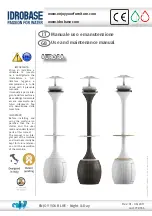
12
4.1
Fitting of the filter
P Pro2000: Remove eventual safety plugs from the filter. Screw the filter tightly in
the connector of the mask (=inh. valve body).
P P blower device: Screw the filters to the blower device and fix the
breathing hose to the connector of the mask.
Promask
2
+ Pro
2
: Align the bayonets on the mask with the slots on the filter and locate the
filter. Turn the filter clockwise ¼ turn
The filter is tight only when the aligning marks (
◄)
are opposite each other and the openings of the splash guards face backwards.
4.2
When needed, connect the spectacles to the inner mask and adjust their position.
4.3
A sweat band is recommended to control excessive hair.
4.4
Loosen the head harness straps.
4.5
Locate the chin pocket of the mask properly on the chin and pull the head harness over the
head.
4.6
Check that the chin is in the chin pocket. Tighten the straps. Start with neck straps, pull
backwards (not outwards). Then adjust the temple straps and finally the upper strap. The
cradle/net lies centered on the back of the head.
Check that the faceseal touches the skin all around, especially under the chin pocket. Try
moving the mask sideways to verify that there is no slippage.
4.7
Check tightness of the mask (two alternative methods):
Cover the exhalation opening of the mask with your hand. Exhale gently to create
overpressure. There must be no leakage between the face and the faceseal.
Cover the filter openings with your hand. Inhale to make the mask press onto your face.
If you fail to get a tight fit (=potential leakage), adjust the head harness and filter, or use
another size of the mask.
5. Maintenance and storage
5.1 Test for function and leak-tightness
If components have been replaced (visor, valve discs or speech diaphragm), a test for function
and leak-tightness must be carried out with an appropriate test device (e.g. Pro-Tester, code
141080). The test is also done in case of a mask stored unused for a longer period, and at least
once a year.
Check also that the faceblank has maintained its shape, the head harness is reasonably elastic,
the visor and the faceseal are undamaged, and that the valve discs and the speech
diaphragm’s O-ring are good and well in position. Damage must be repaired.
5.2 Replacing the visor
The visor is available in polycarbonate or polycarbonate with a chemical-resistant and scratch-
proof coating. The material code is found at the left edge of the visor. Replace visor if
damaged, dirty or scratched.
Material code is shown by an arrow:
1
(not in use)
2
hard coated polycarbonate (HC)
3
(not in use)
F
polycarbonate (PC)

























